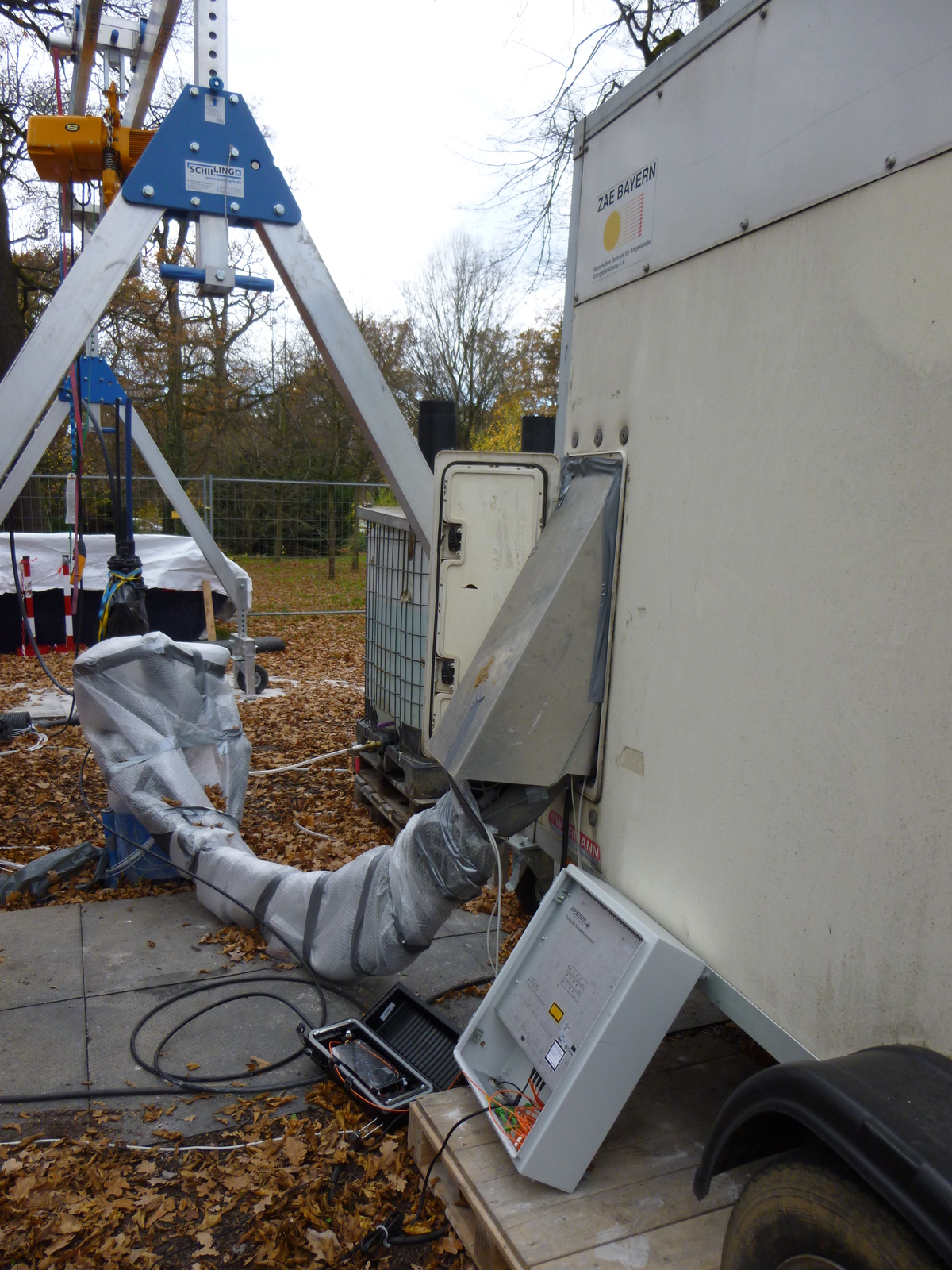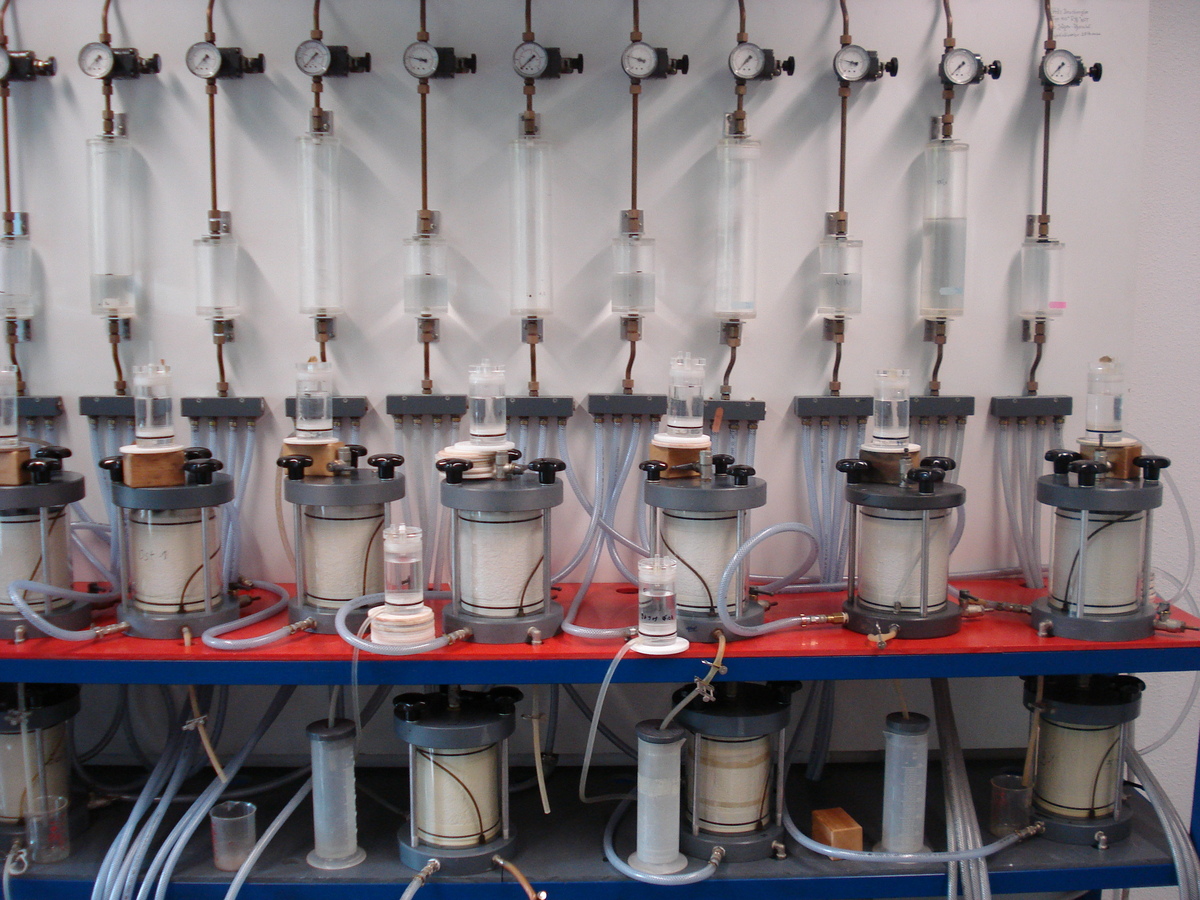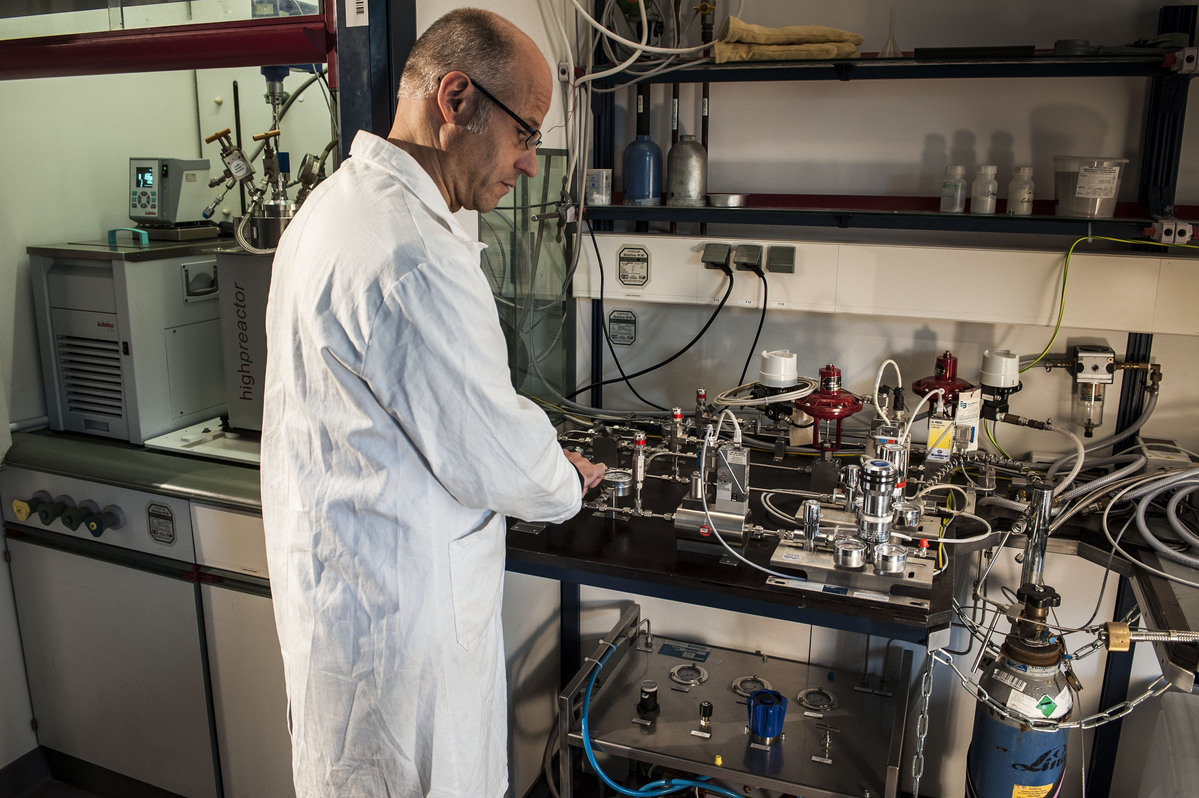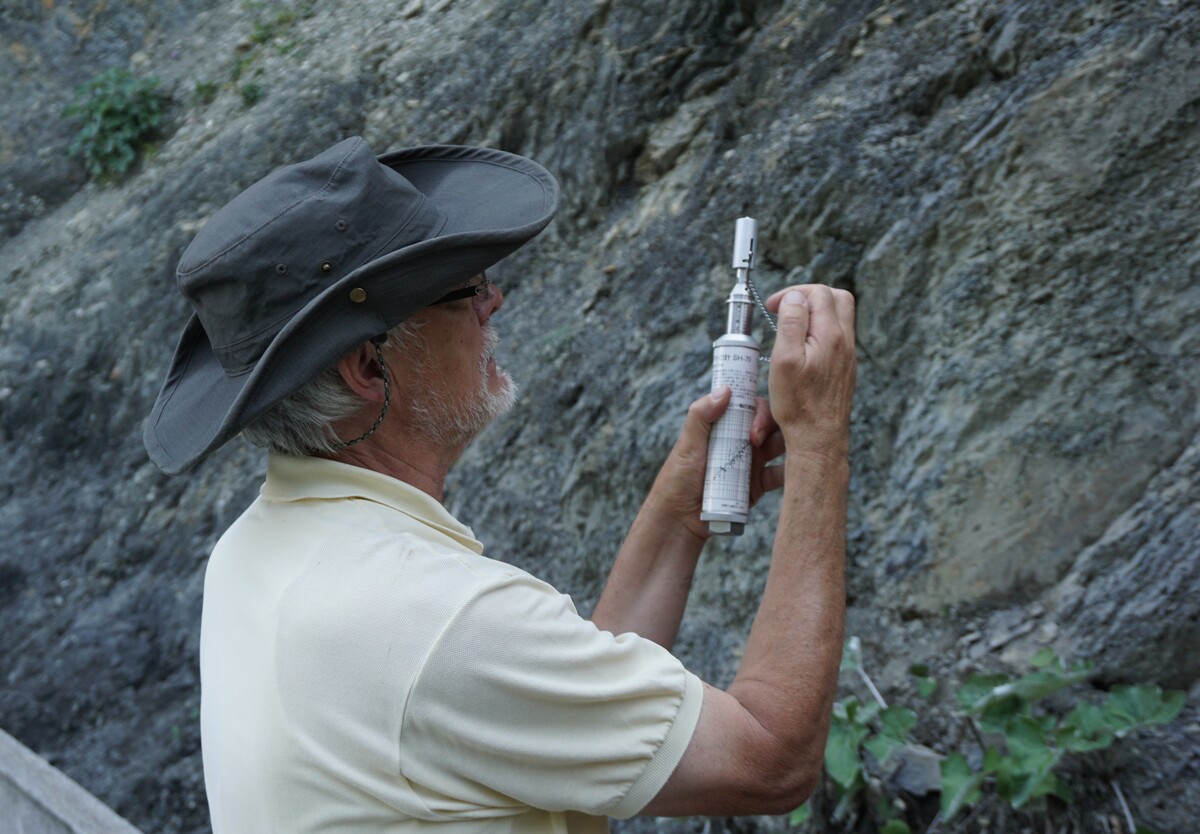Geothermal Lab
Since 2001, the Engineering Geology of Applied Geosciences of the KIT has been dealing with the most diverse questions in the field of geothermal energy and urban heat islands. More than 20 research projects have been carried out that were funded by the Federal Government, the State of Baden-Württemberg, and industry. Besides the investigation of innovative fields of application and technologies for the use of geothermal energy, such as heat pipes and mega-soil basket spiral solutions, one of the main tasks is the research and development of backfill materials for geothermal probes as well as quality assurance in the design, construction, and operation of geothermal probe fields.
Within the research projects the physicochemical and thermal parameters of reservoir and storage rocks as well as of building materials and working media are determined. Furthermore, process-oriented monitoring systems are implemented in the experimental facilities. The focus of all questions is on the practical, experimental data acquisition under scientific aspects. The solution of application-specific problems is based on the method of upscaling, starting from laboratory tests and pilot plant stations up to the construction and operation of test fields. For this purpose, novel test facilities are developed, which are designed on a scientific basis according to the state of the art and are adapted to the problem of the respective research project.
Further studies deal with the special thermal conditions underground in urban areas. Numerous natural and anthropogenic heat sources lead there to large-area temperature increases in the groundwater, the so-called urban heat islands in the underground. Current projects deal with the analytical and numerical simulation of heat transport processes in the subsurface, as well as the ecological and thermal consequences, e.g. in the context of near-surface geothermal use.
The interdisciplinary Geothermal Lab is equipped with extensive measuring instruments and test facilities for research and teaching as well as for cooperation with industrial partners. This allows a wide range of investigation methods from small-scale structural investigations to large-scale test fields to be covered.
Laboratory equipment
Density: In engineering geology, density is a decisive variable. For its exact determination, we have various measuring methods at our disposal, such as the percussion fork test for determining the densest / loosest bedding (DIN 18126) as well as the immersion weighing according to DIN EN ISO 17892-2.
Electrokinetic measuring cell: The remediation of contaminated cohesive soils is still a great challenge today. Electrokinetic soil remediation is a promising and effective method in this context. Electrokinetic measuring cells are available to determine site-specific issues in the run-up to remediation.
Enslin-Neff device: The water absorption capacity is determined in our Enslin-Neff devices.
Condition limits/consistency limits: For the determination of the state limits we have a falling cone device as well as yield point devices according to Casagrande at our disposal.
Hydraulic permeability: The knowledge of hydraulic permeability is essential not only in hydrogeology but also in engineering geology and geothermal energy. Therefore, we have different measuring methods at our disposal such as the Kast measuring device, the air permeameter TinyPerm 3 as well as triaxial measuring cells according to DIN 18130-1 to determine the hydraulic permeability.
Carbon sulphur content: For the determination of the carbon/sulfur content we have the Carbon Sulfur Analyzer CS500 from ELTRA.
Methylene blue adsorption: For the detection of the swellable three-layer clay minerals in a soil we use the methylene blue adsorption method.
loss on ignition: The loss on ignition is determined in our laboratory with a muffle open according to DIN 18128.
Proctor density: The Proctor density, which is carried out in our laboratory according to DIN 18127 in the Proctor test facility, serves as a reference value for assessing the storage density of a floor.
Grain density: For the determination of the grain density we have numerous capillary pycnometers at our disposal.
Pore opening width: The pore opening distribution is a decisive variable in all transport processes taking place underground. To determine the pore spectrum, we have a mercury porosimeter AutoPore IV from Micromeritics.
Rock strength: To determine the strength of rocks we have different measuring methods at our disposal, such as frame shear test, triaxial compression test, point load test, Schmidthammer, vane probe and penetrometer.
Carbonate content: The carbonate content is determined in our laboratory according to DIN 18129 in aCO2 gasometer according to Scheibler.
Batch tests: We have shaking tables and an overhead shaker for carrying out shaking tests.
Grain size distribution: For the determination of the particle size distribution according to DIN 18123 we have a sieve system and aerometer.
Ultrasonic measuring device: We have an ultrasonic measuring device from proceq (TICO) for the non-destructive testing of backfill materials with regard to cavities, cracks, frost effects, strength and modulus of elasticity.
viscosity: Viscosity can be measured in our laboratory with the Brookfield DV-II+ viscometer.
Water chemistry: For the determination of the main and transition elements we have a flame AAS (Shimadzu, AA-7000) with autosampler and microsampling and an AAS from Perkin Elmer (3030B). Furthermore, we have a photometer Nanocolor 500D at our disposal. Furthermore, physicochemical parameters of water such as pH value, redox potential and electrical conductivity can be measured with WTW instruments.
Field devices
Temperature measurement: Several data loggers (Ahlborn & Agilent Technologies) are available for temperature measurement in the field and laboratory. PT-100, NTC as well as thermocouples can be connected here depending on the problem. 2 DTS measuring instruments from AP Sensing are also available. In order to be able to adapt the fibre optic cables to the site conditions, we have a splicing device from Opternus.
Thermal Response Test: We have an ERGT. Here we have the possibility to adjust the heating power according to the drilling depth using a powerful power supply unit. A data logger from Ahlborn is installed to record the heat output. The temperature is recorded by a DTS measuring device from AP Sensing. The measuring device is permanently installed in a box trailer. With the GEOsniff TRT PRO KIT we have a second innovative TRT measuring method from enOware GmbH at our disposal.
Soil air measurement: Several measuring instruments are available for the quantitative evaluation of soil gases and gas permeability: (1) gas permeability with soil air permeameter, (2) CO2, CH4, H2S, O2 with AirTOX soil air measuring device, (3) radon.
Suburban parameters: Determination of the suburban parameters density, sedimentation rate, Marsh time in the course of a geothermal probe drilling
Groundwater level: Several cable light plumbs, some with temperature sensor, automatic pressure sensors including temperature sensor (Diver) for continuous water level measurement
Pumping test equipment: Various pumps (partly controlled by frequency converter) and flow meters for pumping tests.
Physicochemical parameters in groundwater: Flow cells for the measurement of physicochemical parameters such as pH value, redox potential, conductivity, oxygen as well as multi-parameter probes for pressure, temperature and oxygen
Climate station: Climate station for recording temperature, air pressure, wind direction and wind speed, radiation and precipitation
Sampling device for taking thermal water from geothermal plants: A sampling device is available for taking thermal water from geothermal plants. The device is designed for 120°C and 20bar and can keep the water samples constant in pressure and temperature during transport.





